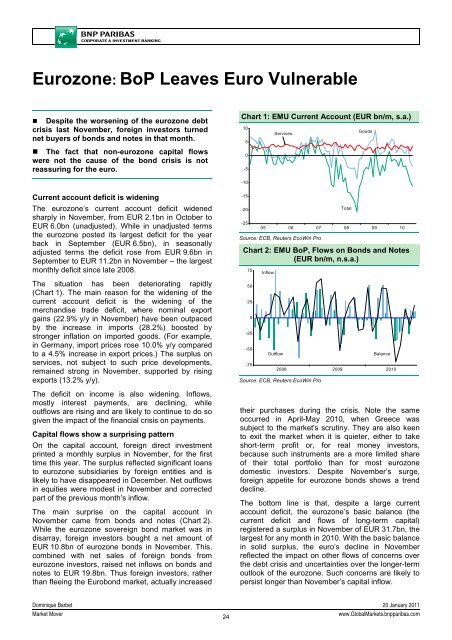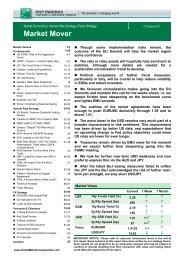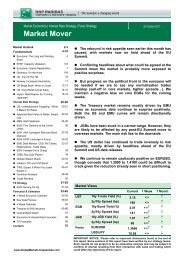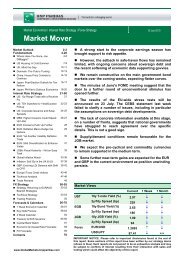Market Economics | Interest Rate Strategy - BNP PARIBAS ...
Market Economics | Interest Rate Strategy - BNP PARIBAS ...
Market Economics | Interest Rate Strategy - BNP PARIBAS ...
Create successful ePaper yourself
Turn your PDF publications into a flip-book with our unique Google optimized e-Paper software.
Eurozone: BoP Leaves Euro Vulnerable<br />
• Despite the worsening of the eurozone debt<br />
crisis last November, foreign investors turned<br />
net buyers of bonds and notes in that month.<br />
• The fact that non-eurozone capital flows<br />
were not the cause of the bond crisis is not<br />
reassuring for the euro.<br />
Chart 1: EMU Current Account (EUR bn/m, s.a.)<br />
10<br />
Goods<br />
Services<br />
5<br />
0<br />
-5<br />
-10<br />
Current account deficit is widening<br />
The eurozone’s current account deficit widened<br />
sharply in November, from EUR 2.1bn in October to<br />
EUR 6.0bn (unadjusted). While in unadjusted terms<br />
the eurozone posted its largest deficit for the year<br />
back in September (EUR 6.5bn), in seasonally<br />
adjusted terms the deficit rose from EUR 9.6bn in<br />
September to EUR 11.2bn in November – the largest<br />
monthly deficit since late 2008.<br />
The situation has been deteriorating rapidly<br />
(Chart 1). The main reason for the widening of the<br />
current account deficit is the widening of the<br />
merchandise trade deficit, where nominal export<br />
gains (22.9% y/y in November) have been outpaced<br />
by the increase in imports (28.2%) boosted by<br />
stronger inflation on imported goods. (For example,<br />
in Germany, import prices rose 10.0% y/y compared<br />
to a 4.5% increase in export prices.) The surplus on<br />
services, not subject to such price developments,<br />
remained strong in November, supported by rising<br />
exports (13.2% y/y).<br />
The deficit on income is also widening. Inflows,<br />
mostly interest payments, are declining, while<br />
outflows are rising and are likely to continue to do so<br />
given the impact of the financial crisis on payments.<br />
Capital flows show a surprising pattern<br />
On the capital account, foreign direct investment<br />
printed a monthly surplus in November, for the first<br />
time this year. The surplus reflected significant loans<br />
to eurozone subsidiaries by foreign entities and is<br />
likely to have disappeared in December. Net outflows<br />
in equities were modest in November and corrected<br />
part of the previous month’s inflow.<br />
The main surprise on the capital account in<br />
November came from bonds and notes (Chart 2).<br />
While the eurozone sovereign bond market was in<br />
disarray, foreign investors bought a net amount of<br />
EUR 10.8bn of eurozone bonds in November. This,<br />
combined with net sales of foreign bonds from<br />
eurozone investors, raised net inflows on bonds and<br />
notes to EUR 19.8bn. Thus foreign investors, rather<br />
than fleeing the Eurobond market, actually increased<br />
-15<br />
-20<br />
-25<br />
05 06 07 08 09 10<br />
Source: ECB, Reuters EcoWin Pro<br />
Total<br />
Chart 2: EMU BoP, Flows on Bonds and Notes<br />
(EUR bn/m, n.s.a.)<br />
75<br />
50<br />
25<br />
0<br />
-25<br />
-50<br />
-75<br />
Inflow<br />
Outflow<br />
2008 2009 2010<br />
Source: ECB, Reuters EcoWin Pro<br />
Balance<br />
their purchases during the crisis. Note the same<br />
occurred in April-May 2010, when Greece was<br />
subject to the market's scrutiny. They are also keen<br />
to exit the market when it is quieter, either to take<br />
short-term profit or, for real money investors,<br />
because such instruments are a more limited share<br />
of their total portfolio than for most eurozone<br />
domestic investors. Despite November’s surge,<br />
foreign appetite for eurozone bonds shows a trend<br />
decline.<br />
The bottom line is that, despite a large current<br />
account deficit, the eurozone’s basic balance (the<br />
current deficit and flows of long-term capital)<br />
registered a surplus in November of EUR 31.7bn, the<br />
largest for any month in 2010. With the basic balance<br />
in solid surplus, the euro’s decline in November<br />
reflected the impact on other flows of concerns over<br />
the debt crisis and uncertainties over the longer-term<br />
outlook of the eurozone. Such concerns are likely to<br />
persist longer than November’s capital inflow.<br />
Dominique Barbet 20 January 2011<br />
<strong>Market</strong> Mover<br />
24<br />
www.Global<strong>Market</strong>s.bnpparibas.com

















